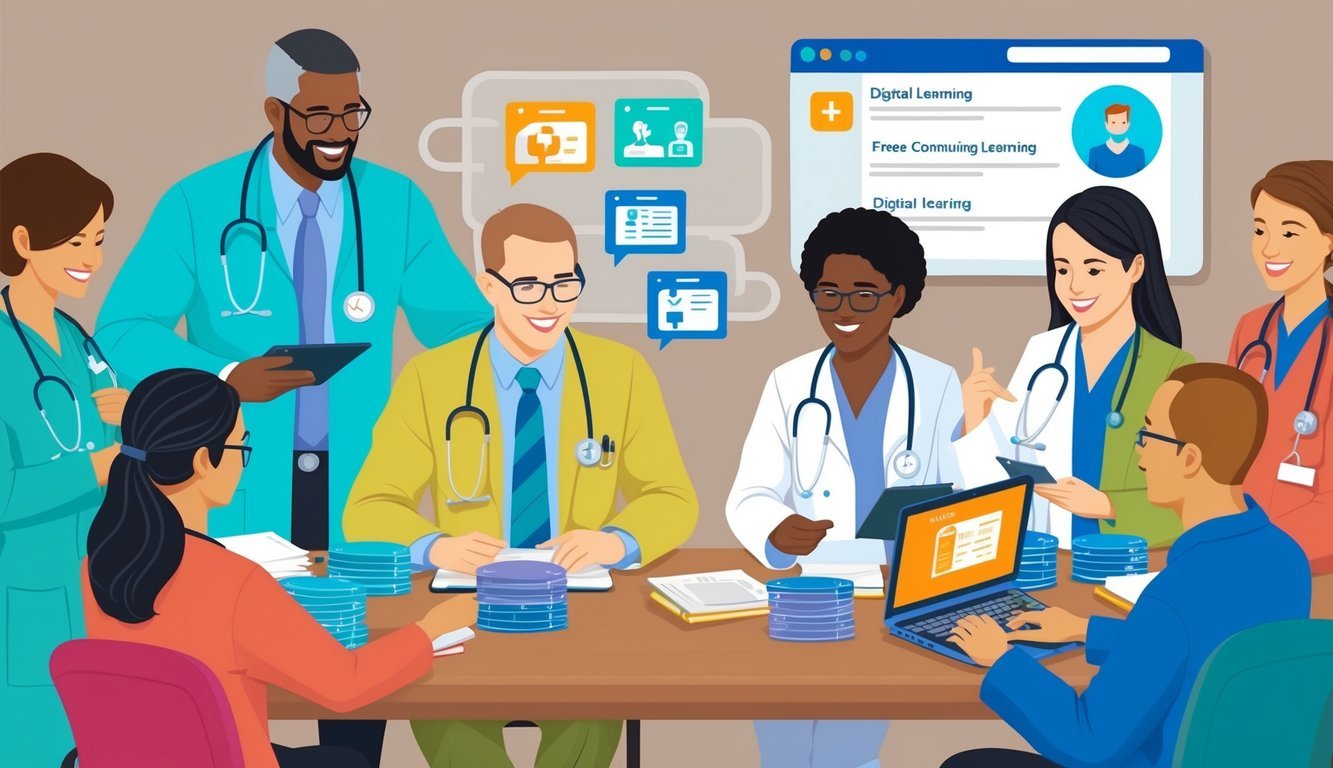Free continuing education is essential for healthcare professionals who want to stay updated with the latest practices and improve their skills.
You can access a variety of resources that offer free courses tailored for nurses, physicians, and other healthcare experts.
This education not only boosts your knowledge but also enhances your ability to provide high-quality care.
Online platforms now make learning more flexible than ever.
You can complete courses at your own pace, fitting them into your busy schedule.
There are specialized programs that focus on important areas like infection control, patient safety, and mental health, allowing you to tailor your professional development to your interests and career goals.
As you explore these free options, you will find that professional development is just a click away.
Embracing these learning opportunities not only benefits you but also improves the care you deliver to your patients.
Key Takeaways
- Free education resources exist for your development as a healthcare professional.
- Specialized courses can enhance your skills in various areas of healthcare.
- Digital platforms provide flexibility to complete your continuing education at your own pace.
Overview of Continuing Education in Healthcare
Continuing education is crucial for healthcare professionals to stay updated on changes in regulations, technologies, and best practices.
It enhances your skills and knowledge, which directly impacts patient care and safety.
Understanding the importance of accreditation, available CE opportunities, and how to access free resources can help you in your professional development.
The Importance of Continuing Education
Continuing education (CE) is essential for healthcare professionals.
It ensures that you have the most current knowledge and skills.
This is key in a field that evolves rapidly due to advances in medical science and technology.
Completing CE reinforces your commitment to your profession.
It is often required for license renewal.
For example, nurses need to acquire continuing nursing education (CNE) credits, while pharmacists might seek continuing pharmacy education (CPE).
These educational activities cover various topics, including infection control, pain management, and patient safety.
By engaging in CE, you enhance your expertise and improve the quality of care you provide.
Accreditation and Certification
Accreditation is significant in ensuring the quality of CE programs.
Organizations like the American Nurses Credentialing Center (ANCC) and the Accreditation Council for Continuing Medical Education (ACCME) regulate these programs.
They ensure that offerings meet specific educational standards.
When looking for CE programs, verify their accreditation.
This assures that the credits you earn are recognized in your field.
Different healthcare fields have varying requirements, so understand which organizations govern your profession.
Common accreditations include:
- ANCC for nursing
- ACPE for pharmacy
- CHES for health education
Being aware of these details helps you choose relevant educational activities that fulfill your certification and licensing requirements.
Free CE Opportunities
Many options exist for free continuing education.
Organizations and platforms provide courses at no cost, allowing you to meet your requirements without financial strain.
For instance, websites like Medline University and Nurse.com offer a variety of free CE courses for healthcare workers.
These courses cover diverse topics and are designed to help you stay compliant with state CE hours.
Many of these courses are accredited, so you earn recognized credits that contribute to your professional development.
Free courses can range from short modules to extensive webinars, so you can choose formats that fit your schedule.
By taking advantage of free CE opportunities, you can advance in your career while adhering to regulatory standards.
Specialized Areas of Continuing Education

Continuing education in healthcare is essential for staying updated on specialized topics.
This knowledge helps improve patient care and safety across various settings.
Here are some specific areas of focus that are valuable for healthcare professionals.
Patient Safety and Quality Care
Patient safety is critical in delivering quality healthcare.
You can find courses that educate on best practices for minimizing errors and enhancing patient care.
Topics might include teamwork, communication strategies, and safety protocols.
Key areas include:
- Error Prevention: Training in how to recognize and prevent common medical errors.
- Quality Improvement Initiatives: Learning about frameworks like Plan-Do-Study-Act (PDSA) to improve processes.
These courses may also cover the impact of Covid-19 on patient safety and how to adapt care protocols.
For resources, explore myCME for related courses.
Infection Prevention and Control
Infection control is vital to public health, especially in the context of global pandemics like Covid-19.
Continued education in infection prevention covers the latest guidelines for reducing hospital-acquired infections.
Topics include:
- Hand Hygiene: Importance of proper handwashing and sanitization techniques.
- Wound Care Management: Best practices for caring for surgical and chronic wounds.
Understanding these practices can significantly lower infection rates in your healthcare setting.
Consider checking CDC resources for more information.
Chronic Disease Management
Chronic diseases such as diabetes, heart disease, and obesity require ongoing management.
Education in this area helps you create effective care plans that address the unique needs of patients.
Focus areas include:
- Nutritional Guidelines: Learning how diet affects chronic conditions.
- Patient Education: Strategies to educate patients about self-management techniques.
Courses can help you improve patient engagement and compliance.
Look into options at Medline University for specialized courses.
Health Equity and Community Health
Health equity focuses on providing all individuals with fair opportunities to achieve good health.
Courses in this area explore ways to address disparities in healthcare.
Key learning points include:
- Cultural Competence: Understanding different cultural perspectives on health.
- Trauma-Informed Care: Approaches to care that consider patients’ histories and experiences.
Educating yourself on these topics equips you to better serve diverse populations.
For additional resources, the CEU Academy offers valuable courses.
Self-Care and Wellness for Healthcare Professionals
Taking care of your own well-being is essential in your role as a healthcare professional.
Practicing self-care can help manage stress and prevent burnout.
Focusing on both physical and emotional wellness will enable you to better support your patients.
Managing Stress and Burnout
Managing stress is critical in your profession.
Long hours and emotional demands can lead to burnout.
You can use several strategies:
- Set Boundaries: Establish clear work/life boundaries to create balance. Monitor your workload and refuse additional responsibilities when necessary.
- Practice Mindfulness: Engage in mindfulness techniques such as meditation or deep breathing exercises. These practices can help you stay focused and calm.
- Take Breaks: Schedule short breaks throughout your day. Use this time to step away from your work and unwind.
For more information on self-care, explore the resources provided by SAMHSA.
Physical and Emotional Wellness
Prioritizing both physical and emotional wellness is crucial.
Consider these key elements:
- Regular Exercise: Engage in physical activity to boost your mood and increase energy levels. Aim for at least 30 minutes of exercise most days.
- Healthy Nutrition: Consume a balanced diet rich in fruits, vegetables, and whole grains. Proper nutrition fuels your body and mind.
- Seek Support: Connect with peers or professional counselors when you feel overwhelmed. Discussing your experiences can provide relief and new perspectives.
Incorporating these practices into your routine can enhance your well-being and job performance.
Resources from Medline University provide additional continuing education on wellness strategies for professionals like you.
Digital Learning Platforms and Resources

Digital learning platforms provide valuable resources for healthcare professionals.
These tools help you gain the knowledge needed to stay current in your field through various formats, making learning accessible and convenient.
Webinars and Online Courses
Webinars are live or recorded online sessions designed to educate healthcare workers.
They allow you to learn from experts in real time or at your convenience.
Many organizations offer free webinars that also qualify for continuing medical education (CME) credits.
Online courses provide a structured learning experience.
You can find options on websites like Nurse.com that feature free nursing continuing education courses.
These courses cover diverse topics, such as patient safety, infection control, and wound care.
Benefits of Webinars and Online Courses:
- Flexible schedules
- Access to expert knowledge
- Earn continuing education units (CEUs)
Virtual Conferences and Workshops
Virtual conferences offer a platform for networking and learning from peers and leaders in healthcare.
Attending these events can enhance your professional knowledge and skills.
Workshops usually focus on interactive learning.
You may participate in hands-on training and discussions with fellow professionals, which improves your learning experience.
Many virtual conferences also provide free or low-cost options.
Check platforms that specialize in healthcare education for upcoming events.
Key Features of Virtual Conferences and Workshops:
- Interactive sessions
- Networking opportunities
- Access to a variety of topics
These digital resources make it easier for you to fulfill your continuing education requirements while enhancing your skills as a healthcare professional.
Strategies for Implementing Continuing Education

Implementing continuing education in your healthcare practice is essential for professional growth.
You can achieve this through careful planning and efficient tracking of your education units.
Developing a Learning Plan
To start, outline a clear learning plan that aligns with your career goals and the requirements for professional development.
Identify the areas where you need to strengthen your skills or knowledge.
Consider what specific competencies you want to acquire, such as patient care techniques or updated medical technologies.
Create a timeline for completing courses or training sessions.
Include various formats, like webinars, online courses, and in-person workshops.
Make sure to select accredited providers to ensure the credibility of your contact hours.
Resources like Medline University can help you find courses that fit your interests and requirements.
Tracking and Documenting CEUs
It is crucial to keep accurate records of your continuing education units (CEUs) to meet licensing and certification requirements.
For each course completed, document details such as the course title, provider, date, and the number of contact hours earned.
You can use spreadsheets or online tools to maintain your records.
Make it a habit to update your documentation after each training session.
This will help prevent last-minute scrambles before renewal deadlines.
Websites like Nurses.com offer tips on CE tracking, ensuring you stay organized and compliant with ongoing education requirements.
Frequently Asked Questions

This section addresses common questions regarding free continuing education for healthcare professionals.
It covers reputable sources, access for different roles, and distinctions between various educational credits.
What are reputable sources for free online continuing education for healthcare professionals?
You can explore several credible platforms for free online continuing education.
The Centers for Disease Control and Prevention (CDC) offers a variety of educational activities that provide free continuing education credits.
Additionally, the Institute for Healthcare Improvement (IHI) has programs that cater to various healthcare roles.
How can nurses access free continuing education units (CEUs)?
Nurses can find numerous free CEU options online.
Websites like Allheart provide over 40 free courses.
These courses range from short sessions to longer credits.
Also, these courses are peer-reviewed and accredited by organizations such as the American Nurses Credentialing Center.
Are there specific free continuing education opportunities for medical assistants?
Medical assistants also have access to free continuing education resources.
Various organizations provide online courses tailored to their needs.
Check with local healthcare agencies and national associations for available options.
Can pharmacy technicians find free accredited continuing education courses online?
Yes, pharmacy technicians can locate free accredited courses online.
Many education websites offer specific programs designed for pharmacy professionals.
However, you should ensure that any course you take is accredited by a recognized body.
What are the differences between Continuing Medical Education (CME) and Continuing Education (CE) credits?
CME credits are specifically for physicians.
They focus on improving their medical knowledge and skills.
In contrast, CE credits can apply to a broader range of healthcare professionals, including nurses and pharmacists.
Does the Centers for Disease Control and Prevention (CDC) provide free continuing education certifications?
Yes, the CDC does provide free continuing education certifications.
On their TCEO platform, healthcare professionals can access a range of courses.
These courses offer free CE credits upon completion.

